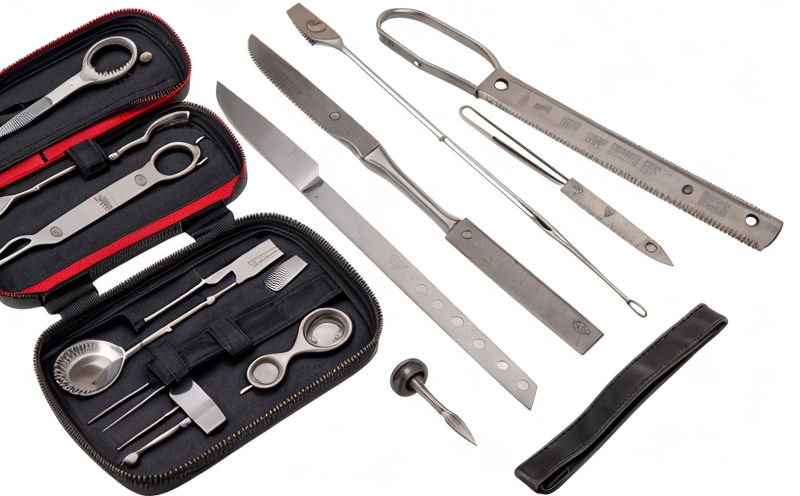Biomechanical Performance Testing of Powered Surgical Tools
The biomechanical performance testing of powered surgical tools is a critical aspect of ensuring medical device safety and efficacy. This process evaluates the mechanical properties, including strength, flexibility, and durability, under conditions that mimic real-world usage scenarios in surgical environments.
Biomechanical testing involves subjecting surgical instruments to various loads and motions to determine their ability to perform safely and effectively without failure or degradation. The tests are designed to simulate the forces applied during actual surgery, ensuring that the tools can withstand these stresses throughout a patient's treatment.
The biomechanical performance of powered surgical tools is essential for several reasons:
- To ensure patient safety by preventing tool failure during critical procedures
- To comply with regulatory requirements and standards such as ISO 14737-2, which specifies the testing methods for powered surgical instruments
- To improve design and optimize performance of new tools before they reach clinical use
- To provide manufacturers with detailed insights into how their tools behave under various conditions, aiding in continuous improvement
The tests are conducted using specialized equipment that can replicate the dynamic environments encountered during surgery. This includes simulating cutting motions, clamping forces, and rotational movements. Specimen preparation is crucial for accurate testing; this involves selecting appropriate materials that mimic human tissue properties such as elasticity and strength.
Once the specimens are prepared, they undergo a series of tests to evaluate different aspects of biomechanical performance:
- Cutting Force Measurements: This test measures the force required to cut through various tissues. It helps identify any potential issues with blade design or material selection.
- Clamping Strength Tests: These tests assess the gripping power of clamps used in surgical procedures, ensuring they securely hold tissue without causing damage.
- Rotational Stability Assessments: For instruments that require precise rotational movement, such as drills and screwdrivers, this test ensures consistent performance across multiple uses.
The data collected from these tests is analyzed to determine compliance with industry standards. Compliance ensures that the surgical tools meet both internal quality control criteria and external regulatory requirements.
At Eurolab, we employ state-of-the-art facilities and experienced professionals who understand the nuances of biomechanical testing for powered surgical instruments. Our comprehensive approach includes:
- Detailed consultation with clients to tailor test protocols to specific needs
- Use of advanced equipment calibrated to industry standards
- Accurate data collection and analysis
- Timely reporting and interpretation of results
Our team works closely with medical device manufacturers, quality managers, and compliance officers to ensure that every aspect of biomechanical performance is thoroughly evaluated. By partnering with us, you gain access to expert knowledge and cutting-edge technology designed specifically for this challenging domain.
Scope and Methodology
The scope of our biomechanical performance testing service includes evaluating the mechanical behavior of powered surgical tools under conditions that simulate actual use in a clinical setting. This encompasses a wide range of tests aimed at assessing various parameters critical to the safe and effective operation of these instruments.
Our methodology follows international standards such as ISO 14737-2, which provides guidelines for testing powered surgical instruments. These standards ensure that our evaluations are consistent with global benchmarks, providing reliable data for regulatory approval processes.
The testing process typically involves several key steps:
- Preparation of Specimens: This step ensures that the materials used in the tests accurately represent human tissue properties. Careful selection and preparation are crucial to obtaining valid results.
- Instrumentation Setup: Each test requires specific instrumentation tailored to the particular type of surgical tool being evaluated. Our lab uses high-quality equipment calibrated according to ISO standards.
- Conducting Tests: Once everything is set up, we run a series of tests designed to simulate real-world conditions. This includes measuring cutting forces, clamping strengths, and rotational stability.
- Data Collection: During the tests, detailed data is collected on various performance metrics. This information forms the basis for our comprehensive reports.
- Data Analysis: After collecting all necessary data, it undergoes rigorous analysis to ensure accuracy and reliability.
- Reporting and Interpretation: Our team prepares a detailed report summarizing the findings of each test. These reports provide valuable insights into the biomechanical performance of the surgical tools being evaluated.
The results of our tests are not only useful for compliance purposes but also serve as invaluable tools for continuous improvement in product design and manufacturing processes.
Eurolab Advantages
Partnering with Eurolab offers numerous advantages when it comes to conducting biomechanical performance testing of powered surgical tools. Our expertise, advanced facilities, and commitment to quality make us a leader in this field:
- Comprehensive Expertise: Our team consists of highly qualified professionals who have extensive experience in biomedical engineering and regulatory compliance.
- State-of-the-Art Facilities: We operate cutting-edge laboratories equipped with the latest testing equipment, ensuring precise and accurate results.
- Global Standards Compliance: All our tests follow international standards like ISO 14737-2, guaranteeing that your products meet global regulatory requirements.
- Dedicated Client Services: We offer personalized consultation to tailor test protocols to your specific needs, ensuring that you get the most relevant and actionable data possible.
- Rapid Turnaround Times: Our efficient processes allow for quick completion of tests without compromising on quality.
- Accurate Reporting: Detailed reports are provided promptly after testing is completed, offering clear interpretations of the results.
- Continuous Improvement Support: By leveraging our insights from biomechanical performance testing, you can make informed decisions about enhancing your products' design and functionality.
Choose Eurolab for all your biomechanical performance testing needs. Let us help you ensure that your powered surgical tools are safe, effective, and compliant with international standards.





